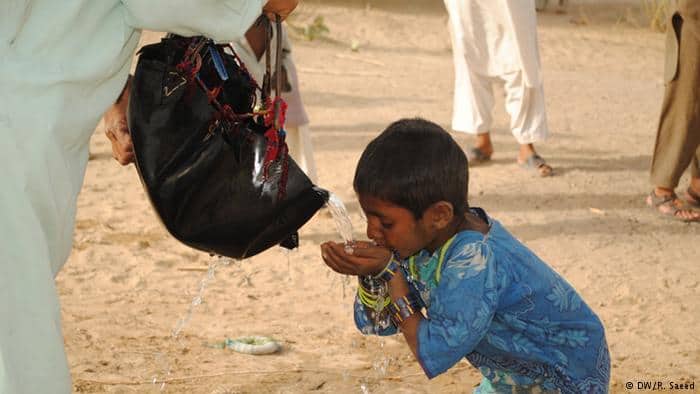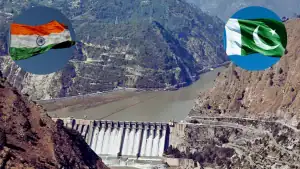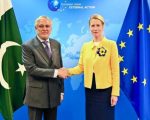ISLAMABAD – Adviser to Prime Minister on Climate Change Malik Amin Aslam Friday said forests and water conservation were the biggest environmental challenges for Pakistan to overcome the existential threat posed to the country due to climate change.
Speaking at a seminar organized by International Union for Conservation of Nature (IUCN) to celebrate International Day for forests and World Water Day here, he said that Pakistan’s forest covers rapidly deteriorating prior to Billion Tree Tsunami (BTT) project. However, after the successful implementation of BTT in Khyber Pakhtunkhwa the forest cover had increased to 26 per cent in the province.
“The credit goes to the entire team for establishing a successful model in Khyber Pakhtunkhwa which has become a milestone for the country in follow suiting green initiatives for reviving depleting vegetation in the country,” the Adviser said.
He said the BTT success was not only the outcome of strong governmental support rather public ownership of the ambitious project to make the country clean, green and climate change resilient which was the key for accomplishing the mega eco-friendly project.
He said the federal government was partnering with the Food and Agriculture Organization (FAO) of the United Nations on forest and water preservation programmes.
“Land Mafia in Punjab is the biggest impediment for the government to implement 10BTT and massive forestation in the province. Most of the forest land in Punjab is encroached by land grabbing mafia whereas 2500 acres in Balloki, 600 acres in Attock and 40 acres land in Jhelum have been retrieved where forestation has been carried out.
Prime Minister Imran Khan himself has visited the Balloki site and kicked off the huge forest plantation campaign. This strong political will is our strength in beating climate change impacts on our country,” Amin said.
Speaking at the water crisis, he said, “Water management is a big challenge both in quality and quantity. The report on the water situation in erstwhile Federally Administered Tribal Areas (FATA) revealed dwindling underground water reserves and polluted aquifer.”
He added that it was part of the Clean Green Pakistan project to rejuvenate underground water table and liquid waste management. Around 90 per cent of liquid waste in the world was treated, recycled and reused whereas, on the contrary, we dump our 90 per cent liquid waste into the sea.
“After every three years, Pakistan flushes 30-40 million acre-feet of water into the Arabian Sea which can be used to charge underground water. Federal Flood Commission is working on Recharge Pakistan with the ministry of climate change to develop wetlands and big ponds in the various areas to store the flood water. Under Ramsar Convention, there are at least 60 sites identified in the country where wetlands will be formed.
“It is heartrending to see that various spells of rains hit Balochistan a drought hit province while the water flows down into the sea which could help in alleviating the drought situation in the province,” the Adviser mentioned.
Country Director, IUCN Mahmood Akhtar Cheema said that Pakistan was a less vegetative covered country and it was a challenge for us to reverse the forest degradation prevailing in the country. BTT, he said was the only project that won Pakistan global acclaim and recognition and the implementing team deserves appreciation and credit.
“Pakistan as compared to China (26 per cent Forest Cover), India (23 per cent) and Nepal (33 per cent) have the lower percentage of forests. 10 BTT is a hope to boost the existing number of forests in the country,” he noted.
Australian High Commissioner Margret Adamson said protecting forests was not about securing trees rather the oxygen they provide, the shelter for wildlife and timber. Forest and water had interconnected relationship as both were the source of life, income, beauty and biodiversity, she added.
“Over 200 million Pakistanis are driving their livelihood from the water resources Indus water system through agriculture, livestock and industry,” she added. Trees and water were under threat alike due to climate change where exploitation of water resources of Pakistan was an issue in the management of the water resources, Margaret Adamson said.
Swiss Ambassador Thomas Kelly said the Swiss government was assisting Pakistan in forestry and other departments and also active in mountainous areas, particularly of Khyber Pakhtunkhwa.
He said we aimed at developing income generation resources of the local community with a massive goal of sustainable development.
United Nations Resident Coordinator Neil Buhne congratulated the provincial government of Khyber Pakhtunkhwa for planting massive trees.
He said Pakistan had the lowest forest cover in the world and on the water security index around the world it came up at number 46 which gives the account of the gravity of the issue.
He said 60 per cent of children deaths under 5 year age was due to dirty drinking water which demanded the relevant stakeholders to take immediate steps for addressing the issue.
Secretary Forest, Environment and Wildlife Khyber Pakhtunkhwa, Syed Nazar Hussain Shah apprised the participants that the forest department lost 12 precious lives while combating timber and land mafia to implement BTT project. He said that massive awareness at local was made during the BTT initiative.
He said IUCN deserves great appreciation for reviving forest cover in Khyber Pakhtunkhwa. Shah urged the key partners and stakeholders to visit Khyber Pakhtunkhwa to review the plantation done and its impact in the region.













